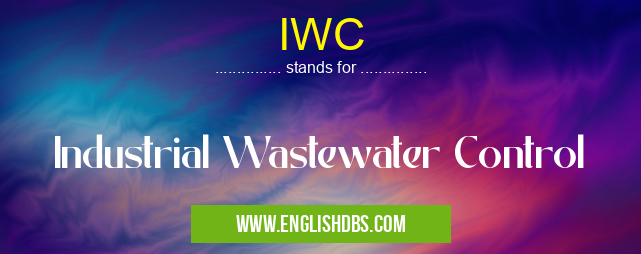What does IWC mean in UNCLASSIFIED
IWC is an acronym that stands for Industrial Wastewater Control. It refers to the management and treatment of wastewater generated from industrial processes. Industrial wastewater often contains high levels of pollutants, such as heavy metals, chemicals, and organic matter, which can pose significant environmental and health risks if not properly treated.

IWC meaning in Unclassified in Miscellaneous
IWC mostly used in an acronym Unclassified in Category Miscellaneous that means Industrial Wastewater Control
Shorthand: IWC,
Full Form: Industrial Wastewater Control
For more information of "Industrial Wastewater Control", see the section below.
What is Industrial Wastewater Control (IWC)?
IWC involves the implementation of various strategies and technologies to:
- Collect and convey industrial wastewater to treatment facilities
- Remove pollutants through physical, chemical, and biological treatment processes
- Monitor and control the quality of treated wastewater before discharge
- Comply with environmental regulations and standards
Significance of IWC
Effective IWC is crucial for several reasons:
- Environmental Protection: It prevents the release of harmful pollutants into the environment, safeguarding water resources and ecosystems.
- Public Health: By reducing the concentration of pathogens and toxic substances, IWC protects human health from waterborne diseases and contamination.
- Compliance with Regulations: Industries are required to comply with stringent environmental regulations regarding wastewater discharge. IWC ensures compliance and minimizes the risk of fines and penalties.
- Resource Recovery: In some cases, industrial wastewater can be treated to recover valuable resources, such as water, energy, and certain chemicals.
Essential Questions and Answers on Industrial Wastewater Control in "MISCELLANEOUS»UNFILED"
What is Industrial Wastewater Control (IWC)?
IWC is a comprehensive approach to managing wastewater generated by industrial processes. It involves monitoring, treating, and disposing of wastewater in a way that protects human health and the environment.
Why is IWC important?
IWC is essential for mitigating the adverse effects of industrial wastewater on water sources, ecosystems, and public health. Untreated industrial wastewater can contain harmful pollutants such as heavy metals, organic solvents, and pathogens. IWC helps to reduce these pollutants to acceptable levels before releasing wastewater into the environment.
What are the key components of IWC?
IWC typically includes:
- Monitoring: Measuring and analyzing wastewater characteristics to identify pollutants.
- Pretreatment: Removing pollutants from wastewater through physical, chemical, or biological processes before it enters a municipal wastewater treatment system.
- Treatment: Using advanced technologies to further remove pollutants and meet regulatory discharge limits.
- Disposal: Discharging treated wastewater into an appropriate receiving environment, such as a municipal sewer system or a water body.
What are the benefits of IWC?
IWC provides several benefits, including:
- Environmental protection: Preventing pollution of water sources and safeguarding aquatic ecosystems.
- Public health protection: Reducing exposure to harmful pollutants and promoting public health.
- Regulatory compliance: Meeting environmental regulations and avoiding penalties for non-compliance.
- Resource conservation: Recovering and reusing wastewater to conserve water resources.
How can I implement IWC in my industry?
Implementing IWC requires a systematic approach involving:
- Assessment: Identifying wastewater sources, pollutants, and potential risks.
- Planning: Developing an IWC plan that outlines treatment and disposal strategies.
- Implementation: Implementing and monitoring the IWC plan to ensure effectiveness.
- Maintenance: Continuously monitoring and maintaining the IWC system to ensure optimal performance.
Final Words: Industrial Wastewater Control (IWC) is essential for mitigating the environmental impact of industrial wastewater and protecting public health. By effectively treating and managing industrial wastewater, we can preserve water resources, reduce pollution, and ensure compliance with environmental regulations.
IWC also stands for: |
|
| All stands for IWC |
